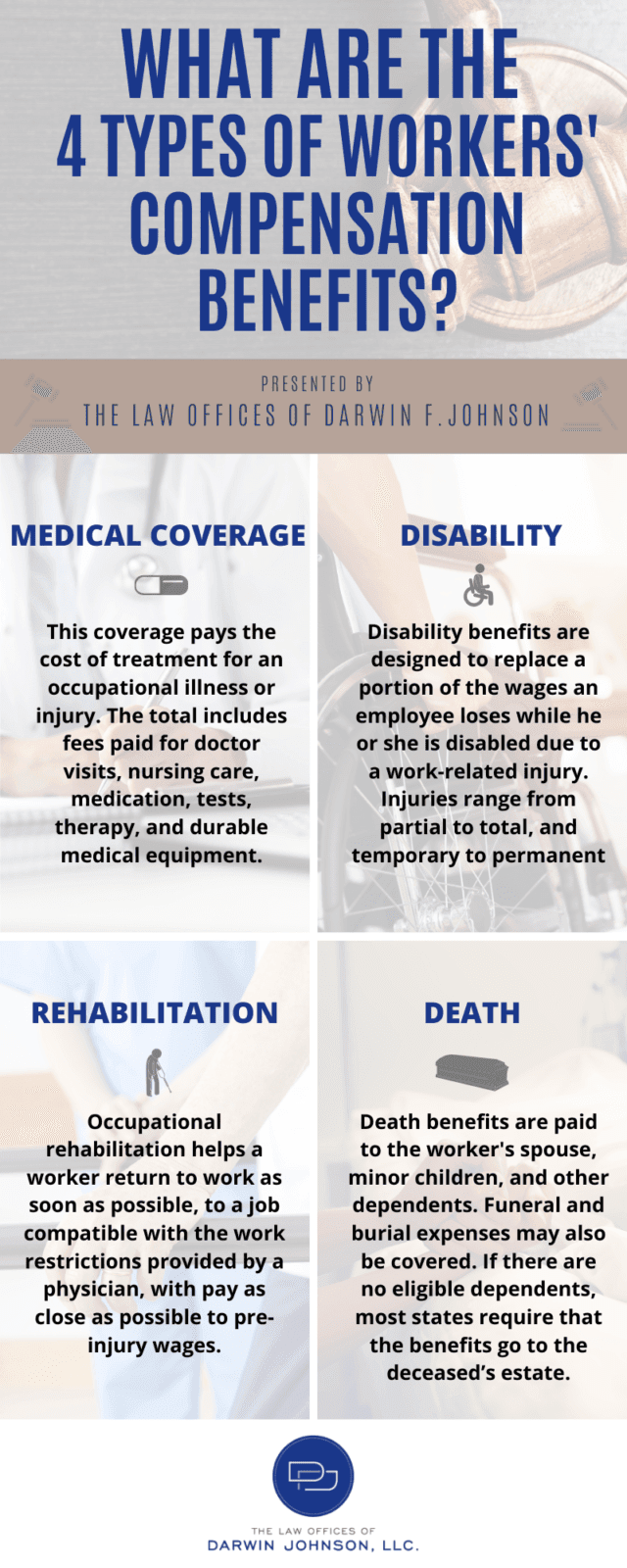As trusted workers' comp attorneys working in Atlanta and the surrounding areas, The Law Offices of Darwin F. Johnson understand how crucial it is for workers to be familiar with available compensation benefits should they suffer a work-related injury or illnesses. States provide four types of benefits, including medical coverage, disability benefits, rehabilitation, and death. While the types of benefits workers can receive are consistent across the nation, the number of benefits provided and how they are delivered varies from state to state. If you require a work injury lawyer in Atlanta, contact The Offices of Darwin F. Johnson today.
Check out this infographic for a quick overview of the four types of workers’ compensation benefits, and continue reading for a more in-depth look at each.

Medical Coverage
This coverage pays the cost of treatment for an occupational illness or injury. The total includes fees paid for doctor visits, nursing care, medication, tests, therapy, and durable medical equipment like crutches and wheelchairs.
An injured worker receives medical coverage has fully recovered from the injury, although state laws differ on what treatments are covered or restricted, such as frequency of visits or duration of in-patient care. When it comes to alternative remedies such as acupuncture or massage therapy, state laws differ in what coverage includes. One of our experienced workman comp attorneys in Atlanta can help injured workers determine a treatment plan that is suitable for them.
In many states, providers are reimbursed based on a fee schedule, which lists the most a provider will receive for each type of treatment. The Offices of Darwin F. Johnson can provide injured employees with a trusted workers' compensation lawyer in Atlanta so they may receive optimal benefits in the event of an occupational illness or injury.
Managed Care
Most managed care plans have one or more of the following features:
- Provider Network. A group of medical practitioners and healthcare providers who have contracted with an employer to provide medical services at a discount. These providers are skilled in occupational medicine as it relates to the field of employment. Some states require injured workers to seek treatment from providers within the network.
- Utilization Management. A process that ensures medical care afforded to workers is necessary, appropriate, and cost-effective.
- Pharmacy Benefit Manager. An administrator of prescription drug programs for commercial health plans. A PBM establishes formularies, negotiates rebates with drug manufacturers, pharmacy contracts, and pays prescription drug claims.
- Medical Care Management. Ensure injured workers receive appropriate treatment so they can return to work upon recovery.
Disability
Disability benefits intend to replace a portion of the wages an employee loses while he or she is disabled due to a work-related injury. While we can provide employees with a work injury lawyer in Atlanta to help build their cases, each disability falls into one of four categories:
- Temporary Total. The employee is completely disabled by the injury and is unable to work for a limited period.
- Temporary Partial. The worker receives a partial disability by a short-term injury but can work part-time.
- Permanent Partial. The worker has sustained a permanent injury, which prevents them from earning as much income as they made before the injury.
- Permanent Total. The worker suffers a permanent injury and cannot earn future income performing the same type of work.
Compensation that an injured worker receives for disability depends on how much they earned before injury or illness occurred, although compensation typically caps at two-thirds of a worker’s wages.
Rehabilitation
Vocational rehabilitation helps a worker return to work as soon as possible, to a job compatible with the work restrictions provided by a physician, with pay as close as possible to pre-injury wages. Severe injuries may require rehabilitative services such as physical therapy that help you recover and regain the skills necessary to perform your job.
If a worker is unable to carry out their job’s duties after a work-related injury or illness, rehabilitation benefits may cover some costs of evaluations, tuition, training, and other expenses required for a worker to assume another position. For more information about rehabilitation, consult one of our workers’ compensation lawyers in Atlanta and the surrounding areas.
Death
If a worker dies because of an occupational injury, death benefits are paid to the worker’s spouse, minor children, and other dependents. Funeral and burial expenses may also be covered. If there are no eligible dependents, most states require that the benefits go to the deceased’s estate.
An experienced workers’ compensation lawyer in Atlanta can help allocate benefits appropriately should you classify as a dependent of a deceased worker.
If you want to schedule a consultation with a first-rate workman comp attorney in Atlanta and the surrounding areas, contact The Offices of Darwin F. Johnson today.
The post What Are the Types of Workers Compensation Benefits? appeared first on The Law Offices of Darwin F. Johnson.

